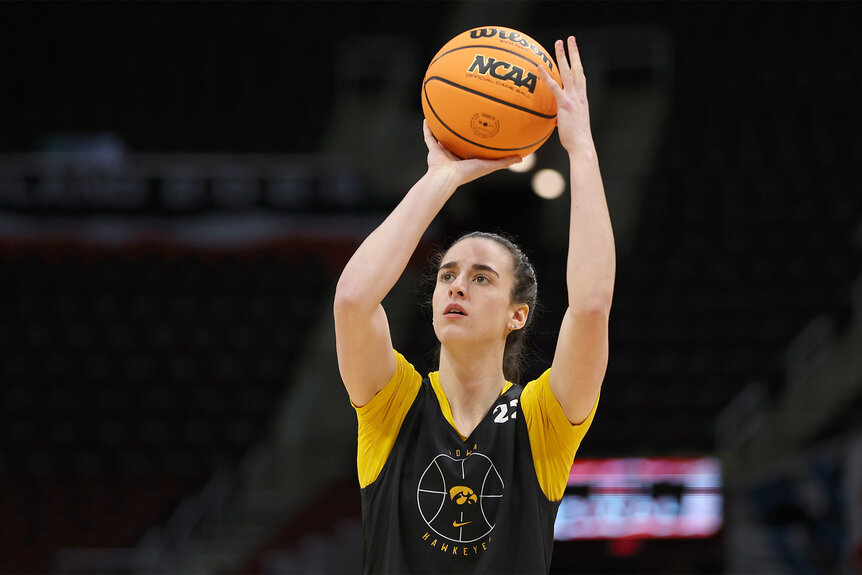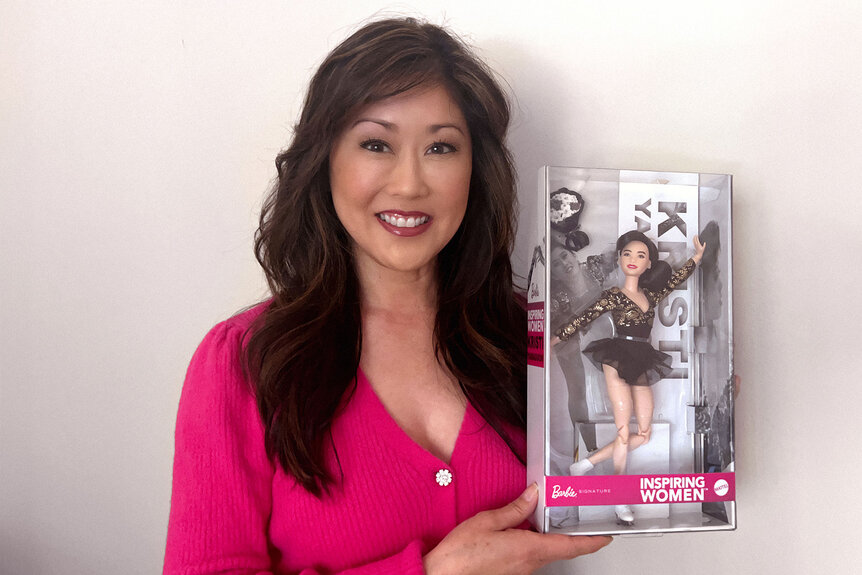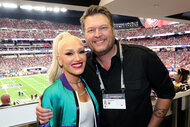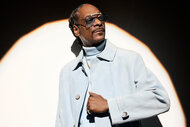Create a free profile to get unlimited access to exclusive show news, updates, and more!
Why Kristi Yamaguchi Says Basketball Player Caitlin Clark Gives Her Hope: "Really Exciting"
In celebration of Asian American and Pacific Islanders (AAPI) Heritage Month, the figure skating legend is being honored with her very own doll from The Inspiring Women Series.
Kristi Yamaguchi is ready to see a new generation of athletes break barriers at the 2024 Summer Olympic Games in Paris, France this July.
The figure skating champion spoke to NBC Insider about the anticipation surrounding the upcoming games as she reflected on her favorite memories and why the sporting event remains important to her. In short, it's all about paving the way for other women and people of diverse backgrounds.
“I think the Olympics and what it stands for — obviously fair play and coming together and peace and it’s not just about winning, it’s about people showing up and being their best that they can absolutely be," Yamaguchi said. "At the core of that, the athletes understand that, and that’s what, as they're training day in and day out, day in day out, that’s what’s top of mind for them in going after that dream."
RELATED: Remarkable Unearthed Clip Shows 8-Year-Old Coco Gauff at Venus Williams' US Open Match
Kristi Yamaguchi says athletes like Caitlin Clark give her hope for the future of women's sports
At the heart of the Olympics’ founding belief of uniting athletes from all backgrounds is diversity and, as someone who was subjected to and endured substantial racial bias throughout her career, even in the realms of sponsorships and endorsements, Kristi Yamaguchi reveals why elevating diversity standards is crucial to future Games and the concept of equality between men’s and women’s sports.
“[Diversity is] what our country is made up of,” started Yamaguchi. “I think it’s just showing… That no matter who you are or what your background is, you can achieve greatness like this. You can dream it. You can go after it.”
The addition of diversity within sports and the ascension of women sports in the current landscape is a trend that has Yamaguchi genuinely excited. And she believes that right now is a "really exciting time in women's sports," with athletes like Caitlin Clark — who might compete in the Games — making headlines in the news.
“I heard the women’s Final Four had higher viewership than the men’s, and I was like, ‘Oh my goodness! We’re getting there,'" she reflected. “That’s only going to happen when there are incredible spotlights shined on athletes like Caitlin and others, who are breaking barriers and boundaries, and showing what’s possible out there."
But how does figure skating stack up, in terms of diversity? "I think figure skating in whole, especially within the United States, is trying to encourage and support diversity within its sport and make sure it becomes more accessible to everyone out there,” states Yamaguchi. “I think there’s still a lot of work to be done [within diversity], but at least it’s at top of mind for people.”
Did Kristi Yamaguchi win an Olympic medal?
In 1992, at just 20 years old, the native of Fremont, California jettisoned herself into the limelight after capturing the gold medal at the 1992 Olympics in Albertville, France. Considering the generational caliber of talent she was up against, this was no small feat. Sandwiched between heavyweights Tonya Harding and Nancy Kerrigan in a stacked super team — similar to what a Team USA women’s gymnastics artistic squad of Simone Biles, Sunisa “Suni” Lee and Gabby Douglas could look like this summer — Yamaguchi prevailed, utilizing a routine strategy that showcased her artistry and well-rounded capabilities. In contrast, the elite Harding and Kerrigan opted for the dreaded triple Axel jump, a flashy yet highly difficult spinning maneuver that consists of three and a half rotations. The tactical gambit paid off after Harding and Japan’s Midori Ito, the first woman to land the impressive jump, fell during their routines, propelling Yamaguchi to the top of the podium.
While Yamaguchi hung up her skates long ago, the 1992 gold medalist and four-time World Champion is using her iconic legacy to inspire future waves of female athletes, including Asian American athletes Alysa Liu and Karen Chen, just like Yamaguchi’s childhood idol Dorothy Hamill did for her, more than three decades ago.
Kristi Yamaguchi’s Favorite Olympic Memory
For athletes like Yamaguchi, who dedicated so much time to the craft, there’s one specific memory that stands out from her Olympic career
“It’s hard to pick just one, but I think walking in and being announced as the United States Olympic team at the Olympic ceremonies,” reflects Yamaguchi, who was inducted in the U.S. Olympic Hall of Fame in 2005. “I think you ask almost any Olympic athlete, and that’s just when reality really hits you. And it’s so incredibly humbling, and it’s such a proud moment as well.”
It's quite the contrast to the moment of “terror” she felt when stepping onto the ice during the pinnacle of the 1992 Albertville Winter Games.
“Really, yeah,” she jokes. “I think there are for sure moments where it’s just like, ‘Ugh, I don’t think I can do this. I think I’m just going to fall apart out there.’ I had to snap myself out of it, and be like, ‘Okay, you put the hours in; you put the work in.’ And I think it was trying to get that positive mind talk in there to say, ‘You’re ready, you’ve trained, you’ve done this back-to-back routine and training clean, this is no different.’”
“It’s almost trying to turn your mind off and your emotions off, and let your body just go on automatic pilot," she continued.
What does Yamaguchi do now?
Though she’s the first Asian American woman to ever win an Olympic gold medal, Kristi Yamaguchi is also a bona fide trailblazer off the ice, publishing five books, including Dream Big, Little Pig!, which appeared on The New York Times Best Seller list. To promote child literacy, Yamaguchi, who recognized “access is one of the biggest challenges, especially for low-income families,” created the Always Dream Foundation for children, a charity that gives kids the “tools to create that foundation of the love of reading,” she told TODAY in 2018. As a youth mentor and role model for children around the globe, she’s a source of inspiration to which there is no end and, in honor of her lasting impact, especially with Asian American athletes, Mattel honored her with her own doll from The Inspiring Women™ Series.
“It resonated when they [Mattel] said, ‘Oh, [it’s] for our AAPI month, and of course I’m like, ‘Oh, okay, this has a good ring to it,’” Yamaguchi said.
RELATED: Revisiting the Legendary 1992 Dream Team and Their Gold-Medal Win at the Barcelona Olympics
“And then, to be a part of the Inspiring Women’s Series. It’s not just about me winning the gold medal and the achievements at the Olympics, but [also] the story of getting there and then also representing the Asian American communities and hopefully being able to inspire other generations of young athletes, young dreamers out there – whatever it may be – to go after their passions and build resiliency, build determination to do that,” she continued. “I think the two-fold there is the Olympic achievement but also honoring AAPI month.”
In previous years, the esteemed series has produced dolls to honor a myriad of celebrated heroines, such as Dr. Jane Goodall, Dr. Maya Angelou, Helen Keller, Eleanor Roosevelt, Billie Jean King, Ella Fitzgerald, Florence Nightingale, Susan B. Anthony, Amelia Earhart, and Rosa Parks, among others.
Though Yamaguchi says being a mentor and role model so early in career was “daunting” at times, as challenging as it was — even attempting to coach up her own daughter Emma in figure skating — the reward of mentorship has always been well worth it.
“At 20, I wasn’t sure what that meant or what I had to do or how to be, and I think as I got older and realized, just try to be yourself,” noted Yamaguchi. “Not everyone is going to like you, or not everyone is going to like everything you do, but some people might, and that’s great.”
She continued, “If you just try to be as positive as you can, and do what’s in your heart, then I think that comes across, and hopefully, that inspires people. …Find your own path; find what it is that is your passion.”
The Kristi Yamaguchi Barbie doll wears a black leotard with shimmering gold accents, inspired by the figure skater’s costume from the 1992 Olympic Games when she won the gold medal. The doll’s accessories are accurate to Yamaguchi's legendary ice-skating Olympian performance, with a gold ribbon in her hair, silvery earrings, a celebratory bouquet and white skates to complete her look.




















